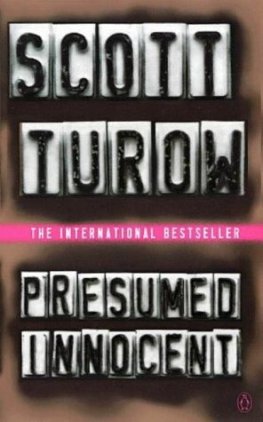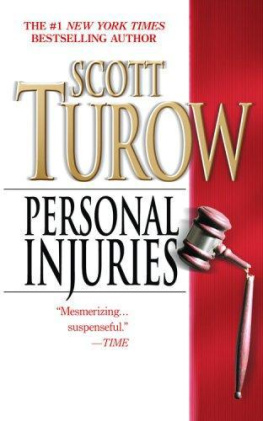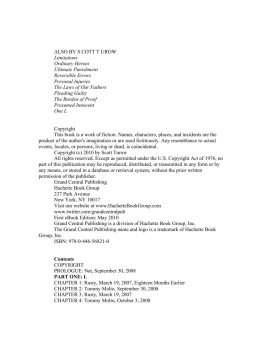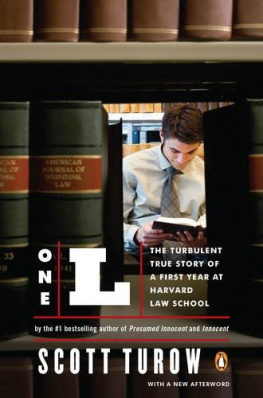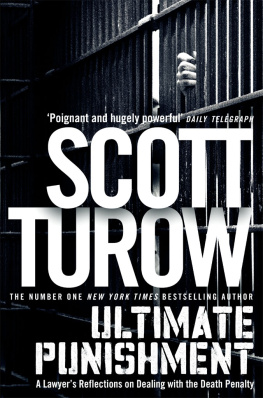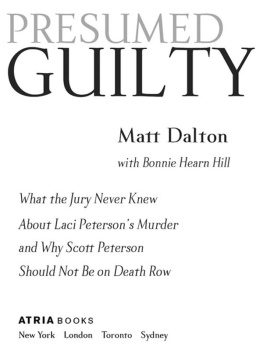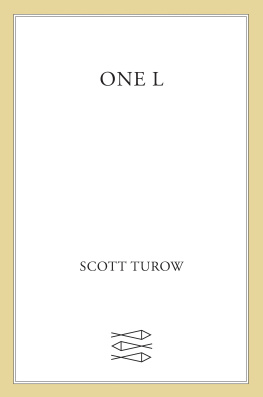Scott Turow - Presumed innocent
Here you can read online Scott Turow - Presumed innocent full text of the book (entire story) in english for free. Download pdf and epub, get meaning, cover and reviews about this ebook. genre: Detective and thriller. Description of the work, (preface) as well as reviews are available. Best literature library LitArk.com created for fans of good reading and offers a wide selection of genres:
Romance novel
Science fiction
Adventure
Detective
Science
History
Home and family
Prose
Art
Politics
Computer
Non-fiction
Religion
Business
Children
Humor
Choose a favorite category and find really read worthwhile books. Enjoy immersion in the world of imagination, feel the emotions of the characters or learn something new for yourself, make an fascinating discovery.
- Book:Presumed innocent
- Author:
- Genre:
- Rating:5 / 5
- Favourites:Add to favourites
- Your mark:
- 100
- 1
- 2
- 3
- 4
- 5
Presumed innocent: summary, description and annotation
We offer to read an annotation, description, summary or preface (depends on what the author of the book "Presumed innocent" wrote himself). If you haven't found the necessary information about the book — write in the comments, we will try to find it.
Presumed innocent — read online for free the complete book (whole text) full work
Below is the text of the book, divided by pages. System saving the place of the last page read, allows you to conveniently read the book "Presumed innocent" online for free, without having to search again every time where you left off. Put a bookmark, and you can go to the page where you finished reading at any time.
Font size:
Interval:
Bookmark:
Scott Turow
Presumed innocent
SPRING
Opening Statement
This is how I always start:
"I am the prosecutor. I represent the state. I am here to present to you the evidence of a crime. Together you will weigh this evidence. You will deliberate upon it. You will decide if it proves the defendant's guilt."
"This man-" And here I point.
You must always point, Rusty, I was told by John White. That was the day I started in the office. The sheriff took my fingerprints, the chief judge swore me in, and John White brought me up to watch the first jury trial I'd ever seen. Ned Halsey was making the opening statement for the state, and as he gestured across the courtroom, John, in his generous, avuncular way, with the humid scent of alcohol on his breath at ten in the morning, whispered my initial lesson. He was the chief deputy P.A. then, a hale Irishman with white hair wild as cornsilk. It was almost a dozen years ago, long before I had formed even the most secret ambition to hold John's job myself. If you don't have the courage to point, John White whispered, you can't expect them to have the courage to convict.
And so I point. I extend my hand across the courtroom. I hold one finger straight. I seek the defendant's eye. I say:
"This man has been accused.-"
He turns away. Or blinks. Or shows nothing at all.
In the beginning, I was often preoccupied, imagining how it would feel to sit there, held at the focus of scrutiny, ardently denounced before all who cared to listen, knowing that the most ordinary privileges of a decent life-common trust, personal respect, and even liberty-were now like some cloak you had checked at the door and might never retrieve. I could feel the fear the hot frustration, the haunted separateness.
Now, like ore deposits, the harder stuff of duty and obligation has settled in the veins where those softer feelings moved. I have a job to do. It is not that I have grown uncaring. Believe me. But this business of accusing, judging, punishing has gone on always; it is one of the great wheels turning beneath everything we do. I play my part. I am a functionary of our only universally recognized system of telling wrong from right, a bureaucrat of good and evil. This must be prohibited; not that. One would expect that after all these years of making charges, trying cases, watching defendants come and go, it might have all become a jumble. Somehow, it has not.
I turn back to face the jury.
"Today you-all of you-have taken on one of the most solemn obligations of citizenship. Your job is to find the facts. The truth. It is not an easy task, I know memories may fail; recollections may be shaded. The evidence might point in differing directions You may be forced to decide about things that no one seems to know, or to be willing to say. If you were at home, at work, anywhere in your daily life, you might be ready to throw up your hands, you might not want to make the effort. Here you must. "You must. Let me remind you. There was a real crime. No one will dispute that. There was a real victim. Real pain. You do not have to tell us why it happened. People's motives, after all, may be forever locked inside them. But you must, at least, try to determine what actually occurred. If you cannot, we will not know if this man deserves to be freed-or punished. We will have no idea who to blame. If we cannot find the truth, what is our hope of justice?"
Chapter 1
I should feel sorrier," Raymond Horgan says.
I wonder at first if he is talking about the eulogy he is going to deliver. He has just looked over his notes again and is returning two index cards to the breast pocket of his blue serge suit. But when I catch his expression I recognize that his remark was personal. From the rear seat of the county's Buick, he stares through the auto window toward the traffic thickening as we approach the South End. His look has taken on a meditative cast. As I watch him, it strikes me that this pose would have been effective as The Picture for this year's campaign: Raymond's thick features fixed in an aspect of solemnity, courage, and a trace of sorrow. He shows something of the stoic air of this sometimes sad metropolis, like the soiled bricks and tarpaper roofs of this part of town.
It is a commonplace among those working around Raymond to say he does not look well. Twenty months ago he split with Ann, his wife of thirty years. He has picked up weight and a perpetual grimness of expression which suggests he has finally reached that time of life when he now believes that many painful things will not improve. A year ago the wagering was that Raymond did not have the stamina or interest to run again, and he waited until four months before the primary to finally announce. Some say it was addiction to power and public life that made him proceed. I believe the chief impulse was Raymond's outright hatred of his primary opponent, Nico Della Guardia, who was until last year another deputy prosecuting attorney in our office. Whatever the motivation, it has proved a difficult campaign. While the money lasted, there were agencies involved and media consultants. Three young men of dubious sexuality dictated as to matters such as The Picture, and saw to it that this image of Raymond was applied to the backside of one in every four buses in the city. In the picture he has a coaxed smile, meant to show a toughened whimsy. I think the photograph makes him look like a kind of sap. It is one more sign that Raymond has fallen out of step. That is probably what he means when he says he should feel sorrier. He means that events seem to be slipping past him again.
Raymond goes on talking about Carolyn Polhemus's death three nights ago, on the first of April.
"It's as if I can't reach it. I have Nico on one side making out like I'm the one who murdered her. And every jackass in the world with press credentials wants to know when we're going to find the killer. And the secretaries are crying in the johns. And in the end, you know, there's this woman to think about. Christ, I knew her as a probation officer before she graduated law school. She worked for me, I hired her. A smart, sexy gal. A helluva lawyer. And you think about it eventually, you know, the actual event-I think I'm jaded, but Jesus. Some cretin breaks in there. And that's how she ends up, that's her au revoir? With some demented slug cracking her skull and giving her a jump. Jesus," Raymond says again. "You can't feel sorry enough."
"No one broke in," I finally say. My sudden declarative tone surprises even me. Raymond, who has momentarily resumed his consideration of a lapful of papers brought along from the office, rears his head and fixes me with an astute gray eye.
"Where do you get that from?"
I am slow to answer.
"We find the lady raped and bound," says Raymond. "Offhand, I wouldn't be starting off my investigation with her friends and admirers."
"No broken windows," I say, "no forced doors."
At this point Cody, the thirty-year copper who is living out his last days on the force by driving Raymond's county car, breaks into the conversation from the front seat. Cody has been unusually quiet today, sparing us the customary reverie about the bum deals and good pinches he has witnessed in gross on most city avenues. Unlike Raymond or, for that matter, me-he has no difficulty bringing himself to sorrow. He appears to have been without sleep, which gives his face an edge of roughened grief. My comment about the condition of Carolyn's apartment has stirred him for some reason.
"Every door and window in the joint was unlocked," he says. "She liked it that way. That broad was living in wonderland."
"I think somebody was being clever," I tell them both. "I think that's misdirection."
"Come on, Rusty," Raymond says. "We're looking for a bum. We don't need fucking Sherlock Holmes. Don't try to get ahead of the murder dicks. Keep your head down and walk in a straight line. Okay? Catch me a perpetrator and save my worthless ass." He smiles at me then, a warm, savvy look. Raymond wants me to know he is bearing up. Besides, there is no need to further emphasize the implications of catching Carolyn's killer. In his reported comments about Carolyn's death, Nico has been base and exploitative and relentless. 'The prosecuting attorney's lax approach to law enforcement for the last twelve years has made him the accomplice of the city's criminal elements. Even the members of his own staff are no longer safe, as this tragedy illustrates.' Nico has not explained how his own hiring by Raymond as a deputy P.A. more than a decade ago fit into Raymond's liaison with lawlessness. But it is not the politician's lot to explain. Besides, Nico has always been shameless in his public conduct. That is one thing that made him ripe for a political career. Ripe or not, Nico is widely expected to lose the primary, now eighteen days away. Raymond Horgan has wowed Kindle County's one and a half million registered voters for better than a decade. This year he is yet to win the party endorsement, but that is largely due to an ancient factional dispute with the mayor. Raymond's political people-a group that has never included me-believe that when the first of the public polls are published in the next week and a half, other party leaders will be able to force the mayor to reverse field, and that Raymond will be safe for another quadrennium. In this one-party town, victory in the primary is tantamount to election. Cody turns back from the front seat and mentions that it is getting close to one. Raymond nods absently. Cody takes this for assent and reaches below the dash to let the siren go. He uses it in two brief spells, almost like punctuation in the traffic, but the cars and trucks part neatly and the dark Buick noses ahead. The neighborhood here is still marginal-older shingle-sided houses, splintering porches. Kids with a kind of potato-y pallor play with balls and ropes at the edge of the street. I grew up about three blocks from here, in an apartment over my father's bakery. I recall them as dark years. During the day my mother and I, when I was not in school, helped my father in the shop. At night we stayed in one locked room while my father drank. There were no other children. The neighborhood today is not much different, still full of people like my father: Serbians, as he was; Ukrainians, Italians, Polesethnic types who keep their peace and their own dim outlook.
Font size:
Interval:
Bookmark:
Similar books «Presumed innocent»
Look at similar books to Presumed innocent. We have selected literature similar in name and meaning in the hope of providing readers with more options to find new, interesting, not yet read works.
Discussion, reviews of the book Presumed innocent and just readers' own opinions. Leave your comments, write what you think about the work, its meaning or the main characters. Specify what exactly you liked and what you didn't like, and why you think so.

